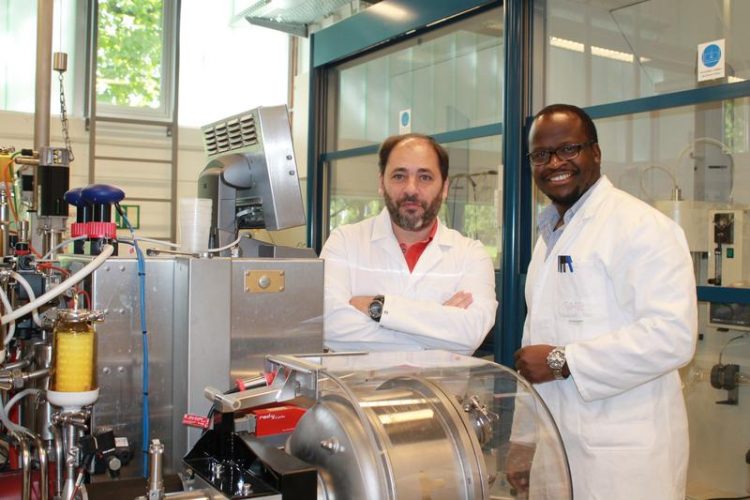Making better use of enzymes: a new research project at Jacobs University

Prof. Dr. Marcelo Fernandez-Lahore (left) with Senior Researcher Dr. Martin Kangwa
Enzymes enable important (industrial) chemical transformations under very mild conditions. Companies need fewer organic solvents and hazardous chemicals, and their energy consumption is reduced.
The use of enzymes therefore leads to more sustainable industrial practices. In particular, there is an increased demand for enzymes in the production of pharmaceuticals, flavors, fragrances and polymers.
Some time ago, scientists at Jacobs University developed a new way to apply the use of enzymes to industrial processes. This process is known as “nanoformulation”. Most enzymes are proteins; under production conditions they become unstable.
“Nanoformulation” makes enzymes more resistant and improves safety in production. The “Nanofacil” project follows on from this research. It is funded by the Central Innovation Program for SMEs of the Federal Ministry of Economics and Energy with around 175,000 euros over a period of three years. Two industrial partners from Germany and Finland are also involved.
About Jacobs University Bremen:
Studying in an international community. Obtaining a qualification to work on responsible tasks in a digitized and globalized society. Learning, researching and teaching across academic disciplines and countries. Strengthening people and markets with innovative solutions and advanced training programs. This is what Jacobs University Bremen stands for.
Established as a private, English-medium campus university in Germany in 2001, it is continuously achieving top results in national and international university rankings. Its almost 1,400 students come from more than 100 countries with around 80% having relocated to Germany for their studies. Jacobs University’s research projects are funded by the German Research Foundation or the EU Research and Innovation program as well as by globally leading companies.
For more information: www.jacobs-university.de
Facebook | YouTube | Twitter | Instagram | Weibo
Thomas Joppig | Jacobs University Bremen gGmbH
Corporate Communications & Public Relations
t.joppig@jacobs-university.de | Tel.: +49 421 200-4504
Commercial registry: Amtsgericht Bremen, HRB 18117
President / Chairman of the Executive Board (Vorsitzender der Geschäftsführung): Prof. Dr. Michael Hülsmann
Managing Director (Geschäftsführer): Dr. Michael Dubbert
Chairman of the Board of Governors (Aufsichtsratsvorsitzender): Prof. Dr. Antonio Loprieno
Prof. Dr. Marcelo Fernandez-Lahore | Professor for Biochemical Engineering
m.fernandez-lahore@jacobs-university.de | Tel.: +49 421 200-3239
Media Contact
All latest news from the category: Life Sciences and Chemistry
Articles and reports from the Life Sciences and chemistry area deal with applied and basic research into modern biology, chemistry and human medicine.
Valuable information can be found on a range of life sciences fields including bacteriology, biochemistry, bionics, bioinformatics, biophysics, biotechnology, genetics, geobotany, human biology, marine biology, microbiology, molecular biology, cellular biology, zoology, bioinorganic chemistry, microchemistry and environmental chemistry.
Newest articles

NASA: Mystery of life’s handedness deepens
The mystery of why life uses molecules with specific orientations has deepened with a NASA-funded discovery that RNA — a key molecule thought to have potentially held the instructions for…

What are the effects of historic lithium mining on water quality?
Study reveals low levels of common contaminants but high levels of other elements in waters associated with an abandoned lithium mine. Lithium ore and mining waste from a historic lithium…

Quantum-inspired design boosts efficiency of heat-to-electricity conversion
Rice engineers take unconventional route to improving thermophotovoltaic systems. Researchers at Rice University have found a new way to improve a key element of thermophotovoltaic (TPV) systems, which convert heat…



